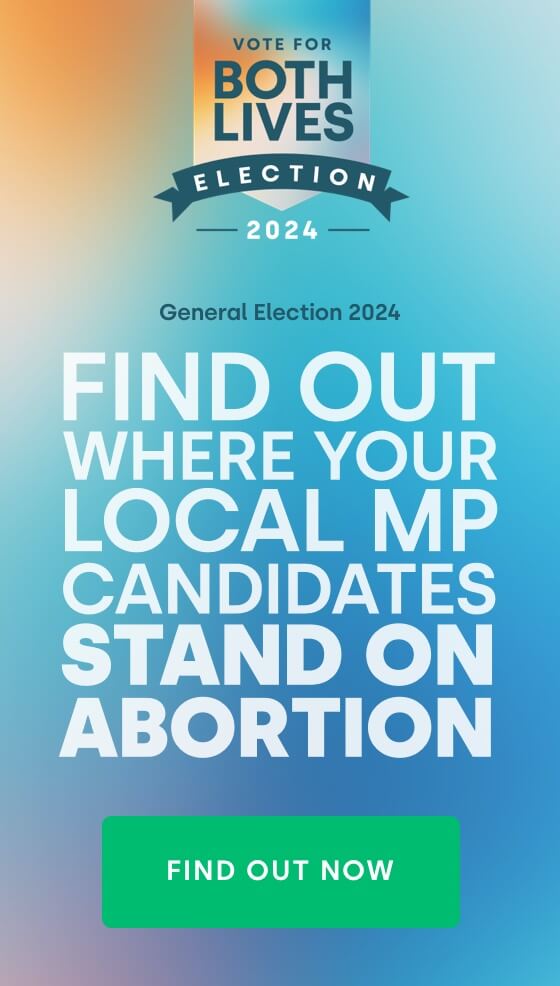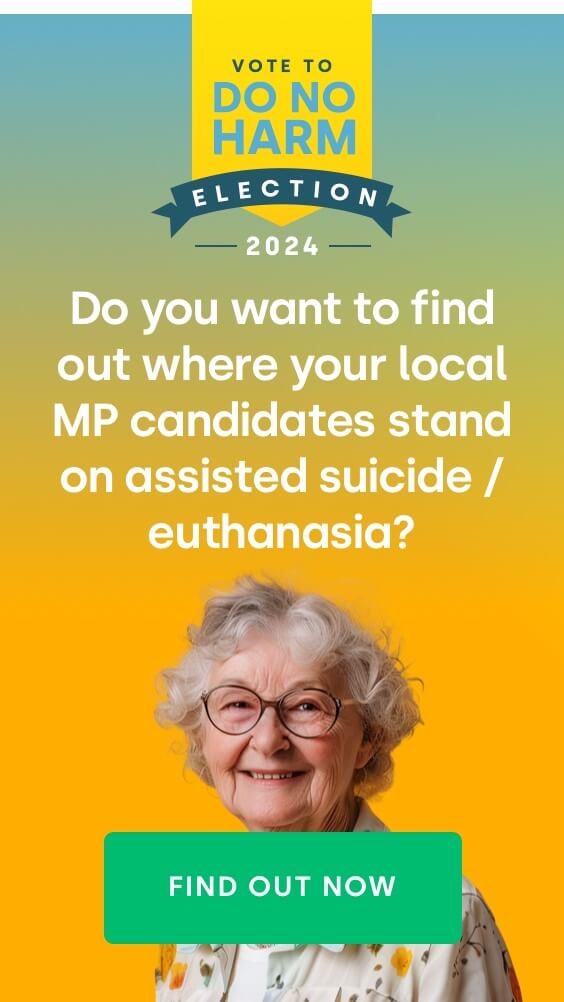Northern Ireland abortion framework
The Conservative Government has proposed imposing an abortion framework for Northern Ireland which goes far beyond the existing law in England, Wales and Scotland – and the limited changes strictly necessary for the Government to comply with the Northern Ireland (Executive Formation etc) Act 2019.
This proposed abortion framework is a blatant attempt by the Government to further undermine the will of the people of Northern Ireland and would likely lead to an even larger increase in the number of lives lost to abortion in Northern Ireland.

What is at stake?
How has the Conservative Government chosen to go much further than legally required?
LEGALLY
REQUIRED
ABORTION FRAMEWORK
The Government is only legally required by the Northern Ireland (Executive Formation etc) Act 2019 to allow abortion for the following cases:
- Threat to physical or mental health
- Life limiting disability
- Rape and incest
CONSERVATIVE GOVERNMENT
ABORTION FRAMEWORK
The Government has proposed a framework that goes far beyond what is required by the 2019 Act.
- Threat to physical or mental health
- Life limiting disability
- Rape and incest
- Abortion on demand, for any reason including sex-selective abortion, through to either 12 or 14 weeks
- De facto abortion on demand for any reason up to either 22 or 24-weeks
- Disability selective abortion for any disability including Down’s syndrome, cleft lip and club foot, right through to birth.
- No legal restrictions on locations where abortions can take place – Abortions could be performed almost anywhere including GPs surgeries, schools, mobile abortion clinics and through ‘Facetime’ consultations.
- Any “registered healthcare professional” would be able to provide terminations – There would be no requirement that a doctor must be involved – healthcare assistants, pharmacists, nurses, midwives, health visitors would be able to provide and approve abortions.
- It would be more difficult to prosecute men who slip abortion pills into a woman’s food
See full details
Backlash against conservative government framework
Latest media coverage
 Doctor Andrew Cupples raises concerns about UK Government’s proposed abortion framework for Northern Ireland
Doctor Andrew Cupples raises concerns about UK Government’s proposed abortion framework for Northern Ireland
 Mum of Down’s syndrome Belfast boy urges PM not to allow abortions over condition
Mum of Down’s syndrome Belfast boy urges PM not to allow abortions over condition
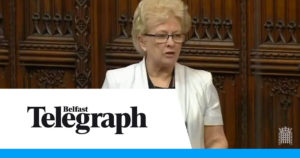 Figures from across political divide unite to oppose abortion law changes in Northern Ireland
Figures from across political divide unite to oppose abortion law changes in Northern Ireland
 Lord Morrow and Baroness O’Loan: Parliament’s new Northern Ireland abortion law undermines Stormont
Lord Morrow and Baroness O’Loan: Parliament’s new Northern Ireland abortion law undermines Stormont
 Bishops oppose the provision of abortion services in Northern Ireland schools
Bishops oppose the provision of abortion services in Northern Ireland schools
 Anti-abortion medics claim NIO consultation on terminations is ‘flawed’
Anti-abortion medics claim NIO consultation on terminations is ‘flawed’
 Baroness O’Loan and Lord Morrow: Abortion consultation must be scrapped and issue left to MLAs
Baroness O’Loan and Lord Morrow: Abortion consultation must be scrapped and issue left to MLAs
 Medics will quit if abortion reform does not protect their right to opt out, warns GP
Medics will quit if abortion reform does not protect their right to opt out, warns GP
 Presbyterian moderator: Abortion proposals go too far, and we ask people to speak up
Presbyterian moderator: Abortion proposals go too far, and we ask people to speak up
 Campaigners against liberalisation of Northern Ireland abortion law ‘shine light for life’
Campaigners against liberalisation of Northern Ireland abortion law ‘shine light for life’
 Pro-life group set to stage second rally at Stormont
Pro-life group set to stage second rally at Stormont
 Abortion law change will ‘negatively impact’ disabled people, claims Belfast mum
Abortion law change will ‘negatively impact’ disabled people, claims Belfast mum
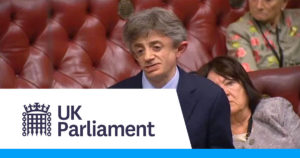 Government forcing disability abortion on Northern Ireland tells people with disabilities ‘you are better off dead’, says Lord Shinkwin
Government forcing disability abortion on Northern Ireland tells people with disabilities ‘you are better off dead’, says Lord Shinkwin
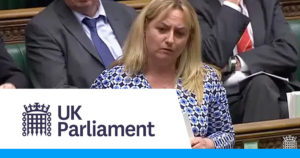 Dr Lisa Cameron raises concerns about the impact of Northern Ireland’s extreme abortion proposals on families with Down’s syndrome children
Dr Lisa Cameron raises concerns about the impact of Northern Ireland’s extreme abortion proposals on families with Down’s syndrome children
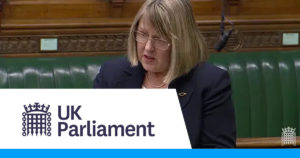 Fiona Bruce MP tells the Government that Northern Ireland’s proposed abortion law goes much further than anticipated
Fiona Bruce MP tells the Government that Northern Ireland’s proposed abortion law goes much further than anticipated
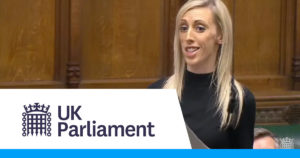 Carla Lockhart MP uses maiden speech to call on Government to respect devolution on the issue of abortion
Carla Lockhart MP uses maiden speech to call on Government to respect devolution on the issue of abortion
Full details
In July 2019 an amendment was passed to the Northern Ireland (Executive Formation etc) Bill requiring the Government to introduce a new abortion framework for Northern Ireland that would have to be implemented by 31st March 2020.
The amendment outlined limited changes to abortion law that would need to be made and implemented.
The Conservative Government has now proposed a framework which goes far beyond the limited changes that are legally necessary to comply with the Northern Ireland (Executive Formation etc) Act 2019.
It is astonishing to see a Government that claims to voters that it is neutral on abortion and supports devolution, to choose to go beyond what is legally necessary, and force the United Kingdom’s most extreme abortion framework on Northern Ireland.
By going much further than what the law requires, the Conservative Government is not only ignoring the will of the people of Northern Ireland, but also ignoring the will of the UK Parliament. This undermines the notion of parliamentary sovereignty which is a key component of Britain’s Constitution.

Legally
required
Abortion framework
The Government is only legally required by Section 9 of the Northern Ireland (Executive Formation etc) Act 2019 (which references the CEDAW report guidelines) to allow abortion in the following cases: |
Conservative
Government’s
Proposed abortion framework
The Government’s proposed framework goes far beyond what is required by the Northern Ireland (Executive Formation etc) Act 2019. |
|
Threat to the pregnant woman’s physical or mental health without conditionality of “long-term or permanent” effects; |
De facto abortion on demand through to either 22 or 24 weeks
(Section 2.2 – page 15)
- There is no legal requirement under the 2019 Act to introduce de facto abortion on demand through to either 22 or 24 weeks.
- The 2019 Act refers to ‘threat’ to mental or physical health whereas the Government’s proposed framework refers to ‘risk’ to health.
- This wording appears to be unjustifiably more permissive than what the Government is legally obliged to implement. This is of particular concern in light of the similarly worded standard in Section 1(1)(a) of the Abortion Act (1967), which has effectively led to abortion for any reason in the rest of the United Kingdom.
- It would therefore be entirely inappropriate for the Government to deviate from a test that assesses the “threat” to the health of the woman concerned.
- The Government has also proposed that abortion would be available on mental or physical health grounds through to 22 or 24 weeks, when there is no requirement at all in the Act to allow abortion on these grounds through to this late gestation.
- Furthermore, there is no basis for extending the test to cover the circumstances of existing children or wider family of the pregnant woman involved, as is outlined in the proposed framework. Such provision again unjustifiably goes beyond the Government’s legal obligations under the 2019 Act.
- De facto abortion on demand to 22 or 24 weeks is far out of line with any previous proposals in Northern Ireland, the most recent of which was to introduce abortion only for babies with life-limiting disabilities.
- It also goes further than where most other European countries sit on this issue. (The most common time limit for most abortions across EU countries is is 12 weeks Similarly across the border in the Republic of Ireland in most cases abortion is restricted to 12 weeks’ gestation.)
|
| Rape and incest |
Abortion on demand including sex-selective abortion through to either 12 or 14 weeks
(Section 2.2 – page 13)
- There is no legal requirement under the 2019 Act to introduce abortion on demand for any reason up to 12 or 14 weeks’ gestation. This grossly exceeds the requirements of the 2019 Act.
- Abortion on-demand, without certification, through to 12 or 14 weeks would allow for sex-selective abortion to be available on-demand.
- In the consultation document such a permissive approach is justified on the grounds that it is complying with the requirement to introduce abortion following sexual crime or incest. They claim that providing it only under these grounds would make it difficult to assess whether a sexual crime has occurred, and therefore it should be available for any reason on demand to 12 weeks. However:
- The UK Government already makes similar assessments in the context of access to benefit payments.
- The Government therefore has no excuse for failing to develop an appropriate assessment system that would comply with its legal duty under the 2019 Act without allowing abortion for any reason whatsoever
- Furthermore, such a system should be designed to confront sexual crime, not ignore it.
|
| Severe foetal impairment, including FFA [fatal foetal abnormalities], without perpetuating stereotypes towards persons with disabilities and ensuring appropriate and ongoing support, social and financial, for women who decide to carry such pregnancies to term. |
Abortion for any disability up to birth, including Down’s syndrome, cleft lip and club foot
(Section 2.2 – page 17)
- The Act only requires legislation for life-limiting disabilities (or fatal foetal abnormalities, as is used in the CEDAW report).
- There is no legal requirement under the 2019 Act to introduce abortion up to birth for any disability, including Down’s syndrome, cleft lip and club foot.
- The proposed framework outlines that abortion for disabilities would be available through to birth when “The fetus if born would suffer a severe impairment, including a mental or physical disability which is likely to significantly limit either the length or quality of the child’s life”
- In England and Wales, wording that has appeared to be similarly restrictive (‘that there is a substantial risk that if the child were born it would suffer from such physical or mental abnormalities as to be seriously handicapped’) has in practice allowed for abortion up to birth for disabilities including Down’s syndrome, cleft lip and club foot.
- This is in conflict with the United Kingdom’s legal obligations under the Convention on the Rights of Persons with Disabilities.
- This again goes far beyond the Government’s legal duty in implementing the 2019 Act and in fact perpetuates harmful stereotypes against people with disabilities.
|
|
No legal restrictions on locations where abortions can take place
(Section 2.6 – page 21)
- To extend abortion provision beyond hospitals or places approved by the Secretary of State would mean that the law in Northern Ireland would go much further on this aspect of the law in England, Wales and Scotland – and again there is no requirement in the 2019 Act for the Government to extend abortion provision in this area.
- In England and Wales, the Abortion Act (1967) currently restricts abortion to hospitals or places approved by the Secretary of State. This means that abortions are available in a limited number of approved locations.
- Under the proposal being consulted on, abortion locations would not be limited in law to hospitals or places approved by the Secretary of State, rather it would be left to Northern Ireland Commissioners to decide where abortions could take place, which could open up abortion locations to the home use of both abortion pills, pharmacies, GP surgeries, school nurse clinics, mobile abortion clinics and ‘telemed’ abortions.
- In other words, abortions could be performed almost anywhere including schools, mobile abortion clinics and through ‘Facetime’ consultations.
- The proposed model would open up abortion provision to a number of issues that would further endanger the safety of women and increase the risk of abortion coercion.
- In particular, it is important to highlight the issues with out-of-clinic use of both abortion pills: mifepristone and misoprostol. If this was permitted under this model:
- Both abortion pills could be taken by the woman or teenage girl alone without the direct support of medical staff.
- When self-administering pills, there is no control over who takes the pills; where the pills are taken; whether the pills are taken; when in the process the pills are taken; if the girl is vulnerable or in an abusive/coercive relationship; if abuse or coercion is involved in taking the pills or if another (competent) adult is present.
- Once the drugs are taken from a pharmacy or clinic, it is not clear how the health services could ensure the pills are taken by women or teenage girls at home.
- It would also be easier for third parties to obtain abortion pills to slip them into a woman’s food without her knowledge.
- Finally, it would be much more difficult for women to distinquish between a pill prescribed by approved abortion clinics or hospitals, and those that are not approved (including those from illegal online sources). Keeping the provision of abortion to specific locations reduces the risk of blending legally approved pill with pills from the ‘black market’. This reduction also reduces the risk to the woman’s health.
|
|
Any “registered healthcare professional” would be able to provide terminations
(Section 2.5 – page 20)
- To extend abortion provision beyond doctors would mean that the law in Northern Ireland would go much further on this aspect of the law in England, Wales and Scotland – and again there is no requirement in the 2019 Act for the Government to extend abortion provision in this way.
- In England, Wales and Scotland, abortions can only be performed by a registered medical practitioner (doctor), Furthermore the Abortion Act (1967) requires the approval of two doctors before an abortion can be performed.
- The wording of “medical practitioner or any other registered healthcare professional” and “appropriately trained and competent” is very vague.
- If the final framework adopted a wide interpretation of the term “any other registered healthcare professional,” this could include healthcare assistants, pharmacists, nurses, midwives, health visitors, dieticians, art therapists and hearing aid dispensers being allowed to provide terminations.
- It is important that only properly trained doctors conduct abortions and that the proposed framework does not go beyond the current law in England, Wales and Scotland on this aspect of the law.
|
|
It would be more difficult to prosecute men who slip abortion pills into a woman’s food.
- In cases where, for example, a woman’s partner puts abortion pills in her food or drink without her knowledge, he can be prosecuted under sections 58 and 59 of the Offences Against the Person Act (OAPA).
- In order to introduce abortion to Northern Ireland, it is precisely these sections of the OAPA that MPs in Westminster voted to repeal. The proposed framework does not mention the introduction of new provisions to ensure that the same protections provided by the OAPA in these circumstances are provided in the new framework.
- It is unlcear now whether it will more difficult to prosecute someone who engages in a non-consensual abortion of this kind, but it is clear the penalties for doing so would be less severe.
|

 Doctor Andrew Cupples raises concerns about UK Government’s proposed abortion framework for Northern Ireland
Doctor Andrew Cupples raises concerns about UK Government’s proposed abortion framework for Northern Ireland Mum of Down’s syndrome Belfast boy urges PM not to allow abortions over condition
Mum of Down’s syndrome Belfast boy urges PM not to allow abortions over condition Figures from across political divide unite to oppose abortion law changes in Northern Ireland
Figures from across political divide unite to oppose abortion law changes in Northern Ireland Lord Morrow and Baroness O’Loan: Parliament’s new Northern Ireland abortion law undermines Stormont
Lord Morrow and Baroness O’Loan: Parliament’s new Northern Ireland abortion law undermines Stormont Bishops oppose the provision of abortion services in Northern Ireland schools
Bishops oppose the provision of abortion services in Northern Ireland schools Anti-abortion medics claim NIO consultation on terminations is ‘flawed’
Anti-abortion medics claim NIO consultation on terminations is ‘flawed’ Baroness O’Loan and Lord Morrow: Abortion consultation must be scrapped and issue left to MLAs
Baroness O’Loan and Lord Morrow: Abortion consultation must be scrapped and issue left to MLAs Medics will quit if abortion reform does not protect their right to opt out, warns GP
Medics will quit if abortion reform does not protect their right to opt out, warns GP Presbyterian moderator: Abortion proposals go too far, and we ask people to speak up
Presbyterian moderator: Abortion proposals go too far, and we ask people to speak up Campaigners against liberalisation of Northern Ireland abortion law ‘shine light for life’
Campaigners against liberalisation of Northern Ireland abortion law ‘shine light for life’ Pro-life group set to stage second rally at Stormont
Pro-life group set to stage second rally at Stormont Abortion law change will ‘negatively impact’ disabled people, claims Belfast mum
Abortion law change will ‘negatively impact’ disabled people, claims Belfast mum Government forcing disability abortion on Northern Ireland tells people with disabilities ‘you are better off dead’, says Lord Shinkwin
Government forcing disability abortion on Northern Ireland tells people with disabilities ‘you are better off dead’, says Lord Shinkwin Dr Lisa Cameron raises concerns about the impact of Northern Ireland’s extreme abortion proposals on families with Down’s syndrome children
Dr Lisa Cameron raises concerns about the impact of Northern Ireland’s extreme abortion proposals on families with Down’s syndrome children Fiona Bruce MP tells the Government that Northern Ireland’s proposed abortion law goes much further than anticipated
Fiona Bruce MP tells the Government that Northern Ireland’s proposed abortion law goes much further than anticipated Carla Lockhart MP uses maiden speech to call on Government to respect devolution on the issue of abortion
Carla Lockhart MP uses maiden speech to call on Government to respect devolution on the issue of abortion

